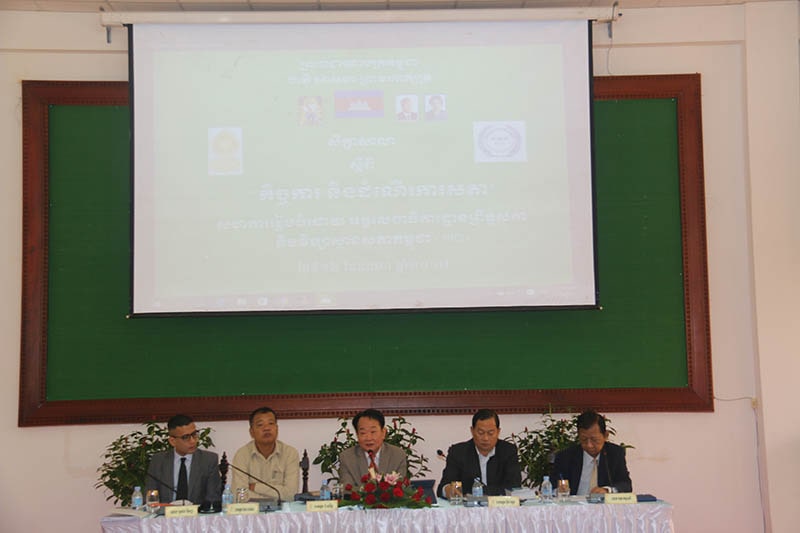A seminar entitled “The Nature and Functions of Cambodia’s Parliament and Government – Examined in an International context” took place on Tuesday 16 May 2017 at the Conference Hall of the Senate of Cambodia. The Seminar was organized by the General Department of Information and Public Relations of the Senate, with support from the Parliamentary Institute of Cambodia.
The 150 participants included parliamentary staff from the Senate, representatives from the Parliamentary Institute of Cambodia (PIC) and PIC regional fellows from Lao PDR, Myanmar, Malaysia, the Philippines and Thailand. The objective of the Seminar was to strengthen and broaden the knowledge of parliamentary staff about the functions and system of government in Cambodia with comparative studies from other systems around the world.
In his opening speech, Mr. Kim Yeat Dararith, PIC’s Executive Director, praised the General Department of Information and Public Relations for focusing on this important topic. He said that the seminar was further evidence of close cooperation between the Senate’s General Department of Information and Public Relations and PIC. It also remained true to the principle of ownership, which means that, in providing technical and financial support, PIC does not impose its own ideas, but responds exclusively to requests and initiatives from the Parliament itself.
Finally Mr. Kim Yeat Dararith praised the effort of the parliamentary staff and urged participants to actively discuss the seminar topic in order to deepen their knowledge and to learn about different issues and challenges in order to identify good recommendations in respect of their current roles. This would enhance their ability to provide a better service for Senators in fulfilling the three main parliamentary functions—Representation, Legislation and Oversight.
After the opening session, Mr. Mousar Hisham, Manager of PIC’s Research Unit, gave a presentation describing how Members of the Cambodian and other Parliaments perform their three main functions. He also described the diverse government and electoral systems, each of which differs from one country to another according to their unique historical, social, political, and cultural contexts.
Following this presentation, H.E. Bun Vuthea, the General Director of Legal Services and Regional Collectivity, outlined some of the basics of the operation and procedures of the Senate of Cambodia including the historical background of the Cambodian parliamentary system, which has been evolving since 1947. He also made a presentation on the structure of the Senate and its General Secretariat, other Groups within the Senate, and the different services each provides.
In his closing remark, H.E Oum Sarith, the Secretary General of the Senate, expressed his particular thanks to PIC for its involvement with this topic: ”Although there are different systems and best practices to learn about, there is no single perfect model that can be copied from one country or system to another,” he said. ”The competence of parliamentary staff can be achieved only through learning-by-doing and experience-sharing.”
H.E. Oum Sarith added that this type of Seminar could, therefore, help parliamentary staff to improve their job performance through a better understanding of their function, of their working practices and of the budgetary rules and procedures with which they were required to comply.
A Question and Answer session gave parliamentary staff the opportunity to ask questions, which mainly focused on the oversight function, the separation of powers, how the Parliament could keep the public informed about the activities of MPs, and the importance of public participation in a democratic Parliament.

